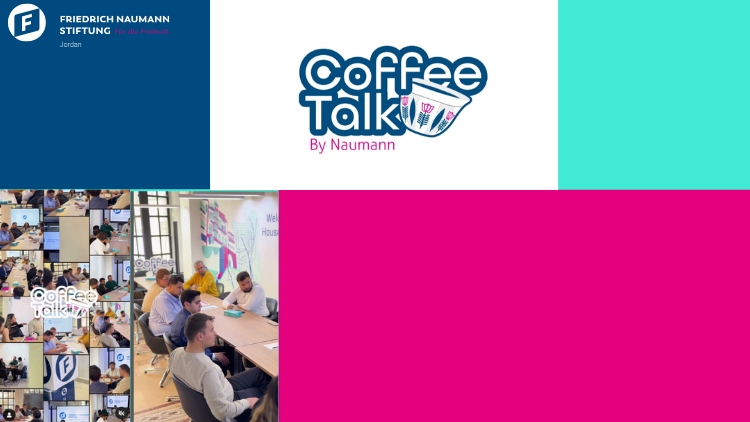Coffee Talk Recap
Guiding the Future – How Civil Society Research Shapes Jordan’s Path

On the evening of March 29, 2025, the Friedrich Naumann Foundation for Freedom Jordan hosted a special Ramadan edition of its ongoing Coffee Talk series, under the theme: “Guiding the Future – How Civil Society Research Shapes Jordan’s Path.” Held at the FNF Jordan office in Amman, the session welcomed an engaged group of youth, civic actors, and researchers to explore the critical role of evidence-based research in shaping public discourse and influencing policy reform in Jordan.
Opening Remarks and Session Framing
The session was moderated by the Jordan Project Coordinator and facilitator Khalil Abu Nijmeh, who opened with a warm welcome and contextualised the objectives of the evening. He introduced Coffee Talk as a youth-led dialogue platform designed to promote liberal values, encourage critical thinking, and cultivate civic engagement. This particular session aimed to examine how civil society research can act as a driving force for positive societal change.
The Role of Civil Society Research in Policy and Advocacy
Through an interactive presentation and guided discussion, participants reflected on the value of civil society research in informing policy, raising public awareness, and strengthening democratic participation. The dialogue emphasised that high-quality, data-driven research enhances the credibility of civil society organisations, enabling them to engage constructively with policymakers and advocate for impactful reforms.
“Today’s discussion helped me see how our voices can gain strength through solid research,” shared one of the participants.

In deep thought: participants reflecting on the challenges and opportunities of conducting civil society research in a shifting political landscape.
Case Studies and Real-World Applications
Participants highlighted notable examples of research-driven advocacy efforts in Jordan, including:
-
Studies conducted by the Arab Renaissance for Democracy and Development (ARDD) on refugee rights.
-
Research by the Jordanian National Commission for Women (JNCW) contributing to gender-responsive legal reforms.
-
Policy briefs addressing youth economic participation, labour market challenges, and education system gaps.
These examples demonstrated how research, when strategically utilised, can influence both institutional policies and public opinion.
Challenges and Opportunities
The open-floor discussion surfaced several persistent challenges facing civil society researchers in Jordan. These included limited access to official data, political sensitivities surrounding certain topics, and the absence of clear dissemination strategies to ensure research findings reach decision-makers and the general public. Participants stressed the importance of translating complex research into accessible and actionable messages that can effectively inform advocacy campaigns and civic initiatives.

The conversation continues: the Coffee Talk created space for meaningful exchanges that blended personal insights with policy perspectives.
Iftar Reflection and Community Engagement
As the session coincided with the holy month of Ramadan, the discussion paused at sunset for a brief reflexion and the communal sharing of an Iftar meal. This moment of togetherness fostered deeper interpersonal connections and allowed for informal exchanges on the themes discussed, reinforcing the community spirit at the heart of the Coffee Talk series.
Conclusion and Next Steps
The evening concluded with a summary of key insights and an open invitation for continued engagement in future Coffee Talk sessions. Participants expressed strong interest in sustaining these conversations and further exploring how youth and civil society can collaboratively contribute to Jordan’s development through informed civic action.
The Friedrich Naumann Foundation in Jordan remains committed to creating inclusive spaces where young change makers can engage with pressing issues, exchange ideas, and strengthen their role in shaping a freer, more democratic future.
Highlights from our latest Coffee Talk session.